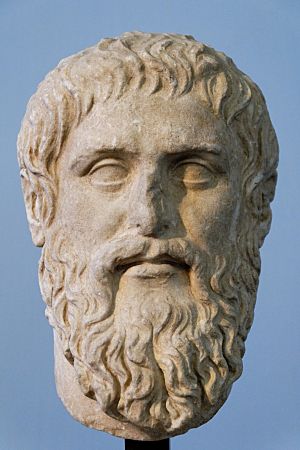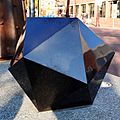Plato facts for kids
Quick facts for kids
Plato
|
|
|---|---|

Roman copy of a portrait bust c. 370 BC
|
|
| Born | 428/427 or 424/423 BC |
| Died | 348/347 BC (aged c. 80) Athens, Greece
|
|
Notable work
|
|
| Era | Ancient Greek philosophy |
| School | Platonic Academy |
| Notable students | Aristotle |
|
Main interests
|
Understanding knowledge and reality How societies should be run |
|
Notable ideas
|
Allegory of the Cave Important virtues |
|
Influences
|
|
|
Influenced
|
|
Plato (pronounced PLAY-toe) was an important ancient Greek philosopher from Athens. He was born around 428/427 or 424/423 BC and died in 348/347 BC. Plato started a famous school in Athens called the Academy. His ideas became known as Platonism. He is one of the most important thinkers in the history of philosophy. His teacher was Socrates, and his most famous student was Aristotle.
Contents
Who Was Plato?
Plato's ideas have shaped how people think about many things. These include how we learn and how societies should be organized. He wrote many books, mostly as conversations. These books are still studied today.
We do not know much about Plato's early life. He came from a rich and powerful family in Athens. Most experts believe he was born between 428 and 423 BC. Plato did not write much about himself. However, he often mentioned his relatives in his books. His brothers, Adeimantus and Glaucon, appear in his famous book Republic.
Later in his life, Plato got involved in politics. He visited Syracuse, a city on the island of Sicily. He tried to help a friend, Dion, influence the ruler. These political adventures were quite dramatic. Plato was even held against his will for a time.
Plato's Famous School: The Academy
When Plato was about 40 years old, he started his own school. It was a school of philosophy in Athens. He called it the Academy. It was named after a nearby grove dedicated to a Greek hero. This school was very important. It operated for many centuries until it was destroyed in 84 BC. Many great thinkers studied there. This included Aristotle, who became a very influential philosopher.
Plato's Writings and Big Ideas
Plato wrote many works. Most of them are dialogues. Dialogues are conversations between different characters. He also wrote some letters. Most of his important works are widely accepted as truly written by him.
We do not know the exact order Plato wrote his dialogues. However, scholars usually group them into three periods:
- Early works: These often feature Socrates asking questions. They explore ideas, like Apology (Socrates' defense speech) and Crito.
- Middle works: In these, Plato's own ideas start to become clearer. Famous examples include Republic, Symposium, and Phaedo.
- Late works: These are often more complex. They explore deeper philosophical questions. Examples are Laws and Timaeus.
What Are Plato's Dialogues?
Plato's dialogues are like plays. Different people talk and argue about a specific topic. Often, Socrates is a main character. He asks questions and challenges others' ideas. This conversational style makes the dialogues interesting. It lets readers think for themselves about different viewpoints. They are meant to make you think deeply about important questions.
Plato's Theory of Forms
One of Plato's most famous ideas is his Theory of Forms. He believed that beyond our physical world, there is a perfect, unchanging realm of "Forms" or "Ideas."
Imagine you see many different dogs. They all look a bit different. But you know they are all dogs. Plato would say that is because they all share in the perfect "Form of Dogness." This perfect Form exists in another realm. The physical dogs we see are just imperfect copies or shadows of this perfect Form. This applies to everything. It includes trees, chairs, and even concepts like beauty, justice, and goodness. The "Forms" are the true reality. Our world is just a reflection of it.
At the very top of all these Forms is the "Form of the Good." Plato believed this was the ultimate source of all truth and reality.
Understanding the Soul
Plato believed the soul is what gives life to the body. He thought the soul was immortal. It would be reborn into a new body after death. He saw the soul as separate from and more important than the physical body.
Plato divided the soul into three parts:
- Reason (logistikon): This part seeks truth and wisdom.
- Spirit (thymoeides): This part handles emotions. These include anger, courage, and honor.
- Appetite (epithymetikon): This part is responsible for basic desires and pleasures. For example, hunger and thirst.
Plato believed that for a person to be good and happy, reason should guide the spirit. It should also control the appetites.
How We Gain Knowledge
Plato thought there were two main ways to understand things. These were through knowledge and through belief. He said that true knowledge is always correct and can be proven. Belief, however, can be right or wrong. It is often based on what someone tells you.
Plato famously suggested that true reality is not found just by using our senses. Our senses are seeing, hearing, and touching. He believed that if you only trust what your eyes see, you might be "blind" to deeper truths. This is why he said that "I know that I know nothing". This means that truly wise people understand how much they do not know.
Ideas About Right and Wrong
Plato's dialogues also explore what it means to be good and what justice is. In his book Republic, he asks, "What is justice?" and "Why should we be good?"
Plato's answer is that being just means seeking wisdom. It means understanding the "Form of the Good." When people understand this ultimate goodness, they will know how to act rightly. They will also fulfill their role in society. He believed that "The Good" is the highest idea. It is even beyond what we can normally understand.
Plato's Thoughts on Government
Plato also wrote a lot about how societies should be governed. In Republic, he suggests that a good society should have three main groups. These are similar to the three parts of the soul:
- Workers: These are the farmers, craftspeople, and merchants. They represent the "appetite" part of the soul. They focus on basic needs.
- Guardians (or Warriors): These are the brave and strong people. They protect the society. They represent the "spirit" part of the soul.
- Rulers (or Philosopher Kings): These are the intelligent, wise, and self-controlled leaders. They make decisions for everyone. They represent the "reason" part of the soul. There are very few of them.
Plato believed that if a society does not follow this ideal structure, it will decline. It would go from a good government (like an aristocracy, ruled by the best) to worse forms. This would eventually lead to a tyranny. A tyranny is rule by one person who abuses power.
Art, Stories, and Myths
Plato also discussed art. This included poetry and public speaking (rhetoric). He thought that poetry, when inspired by the muses, was powerful. But it was not always based on pure reason. He understood that people love stories. So, he often used myths and allegories (symbolic stories) to explain his philosophical ideas. Famous examples include the story of Atlantis, the Myth of Er, and the very famous Allegory of the Cave.
Why Plato is Still Important Today
Plato was a pioneer in writing philosophical dialogues. He also used dialectic. This is a method of discussion to find truth. He brought up many important questions. These questions are still debated in philosophy today. His most famous contribution is the Theory of forms. This theory tries to explain how universal concepts (like "beauty" or "justice") exist. He also gave his name to ideas like Platonic love (a deep, non-romantic affection) and the Platonic solids (special geometric shapes).
Plato's writings have always been read and studied. His ideas greatly influenced both Christian and Islamic philosophy. A famous philosopher named Alfred North Whitehead once said that "the safest general characterization of the European philosophical tradition is that it consists of a series of footnotes to Plato." This means that many later philosophical ideas can be seen as building upon or responding to Plato's original thoughts.
Fun Facts About Plato
- Plato was actually a pen name! His real name was Aristocles. His wrestling coach supposedly gave him the nickname "Platon" (meaning "broad") because of his strong build.
- Plato was influenced by his teacher Socrates. He was also influenced by earlier philosophers like Pythagoras, Heraclitus, and Parmenides.
- Amazingly, almost all of Plato's writings are believed to have survived completely for over 2,400 years. This is very rare for ancient texts.
- There are about 250 known handwritten copies (manuscripts) of Plato's works still existing today.
Images for kids
-
Plato (left) and Aristotle (right) in The School of Athens, a famous painting by Raphael. Plato points upwards, representing his focus on Forms, while Aristotle gestures to the earth, representing his focus on the physical world.
See also
 In Spanish: Platón para niños
In Spanish: Platón para niños
 | Emma Amos |
 | Edward Mitchell Bannister |
 | Larry D. Alexander |
 | Ernie Barnes |













